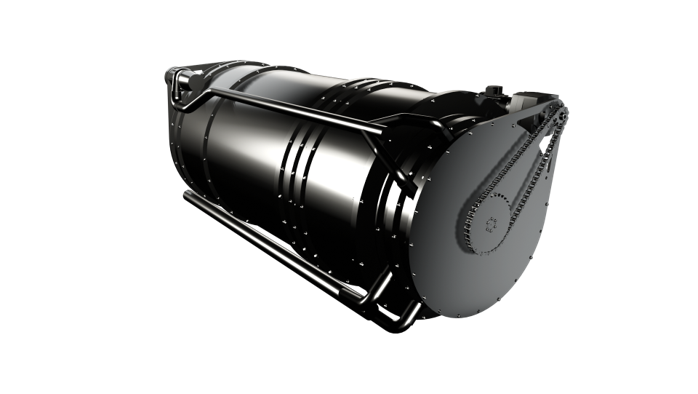Industrial generators have long relied on diesel fuel in locations like a construction site where diesel is already being used and is readily available or on gas in deployments at oil fields, where the fossil fuel is abundant. The next generation of generators is being developed to work with renewable fuel sources. Intelligent Power Generation (IPG) has developed a 100kW Flameless Ceramic Turbine Generator that works with any type of renewable fuel (hydrogen or biofuel) without any pollution. The climate tech startup is the first to offer this fuel-flexible application that’s commercially viable in terms of cost for businesses. IPG is currently focused on powering electric vehicle infrastructure, grid balancing for use with solar and wind applications, and temporary power solutions.
London TechWatch caught up with CEO Toby Gill to learn more about the work that has gone into developing the company’s pioneering technology, future plans, and latest round of funding.
Who were your investors and how much did you raise?
Intelligent Power Generation has secured £2 million towards their Series A funding round led by a consortium of experienced angel investors who collectively bring a breadth of experience from across the energy sector. IPG continues to seek a further £1-2.5 million to be raised before final close.
Tell us about your product or service.
Intelligent Power Generation (IPG) is reinventing fuel-based power for the renewable future to enable industries and businesses to end their reliance on fossil fuel generators.
The Flameless Ceramic Turbine is a 100kW modular generator, designed to de-risk to the transition to hydrogen and biofuels by delivering fuel-flexible, pollutant-free power.
Breakthrough flameless combustion enables seamless operation on any alternative fuel, whilst preventing the formation of pollutant emissions. Efficiencies comparable to power plants and low-cost design principles then combine to deliver a levelised cost of energy comparable to a diesel genset.
As a cleaner-and-greener alternative to the diesel generator, the Flameless Ceramic Turbine enables businesses to continue to benefit from the demand-responsive, dispatchable properties of fuel-based power generation, without the pollutants and carbon emissions typical of fossil fuel generators.
 What inspired the start of Intelligent Power Generation?
What inspired the start of Intelligent Power Generation?
To date, innovation in the energy sector has mainly focused on wind and solar generation. As a result, we have the road map for the majority of our renewable energy, but the challenge we now face is in developing the supporting infrastructure we need for an energy system that is equally resilient, secure, and affordable.
IPG have spent four years and nearly £7 million embarking on a high-risk, highly-challenging, deep-tech mission to develop a solution to this problem. The result is a technology that enables net-zero- and zero-carbon fuels to become a true alternative to fossil fuels in many distributed power applications by ensuring they are economically viable for businesses.
How is it different?
Our innovation in fuel-flexible flameless combustion is what differentiates IPG’s product from existing renewable-fuel-based power technologies, presenting a true route to disrupting the reliance on diesel generators in distributed power applications.
In today’s uncertain and evolving fuel landscape, fuel-flexibility is crucial to decarbonising fuel-based power by de-risking the switch to renewable fuels for businesses. Of the existing technologies today, fuel cells principally only operate on hydrogen or methane-rich fuels, and with the timelines to the availability of green hydrogen unpredictable, they quickly become an uneconomical natural gas generator. Conventional microturbines can operate on multiple waste biogases, but do not have the flexibility to also operate on pure hydrogen and still produce harmful pollutants.
IPG is the first company to develop a truly fuel-flexible and pollutant-free power generator. It represents a single investment today for all the alternative fuels of tomorrow.
What market you are targeting and how big is it?
The distributed power generation market extends across industries, supporting businesses that require grid-independent power generation where national grid infrastructure is unavailable, as well as providing resilience and flexibility needed to support the large-scale integration of wind and solar our energy grid.
The market is predominantly made up of diesel generators and natural gas turbines, and is projected to be worth $22bn in 2022. Innovations in wind and solar, and battery storage and fuel cell technologies are increasingly challenging the dominance of these technologies. The challenge, however, is that on-demand, dispatchable power has an even more crucial role in our global energy mix, and we need technologies that can economically unlock the transition to the renewable fuel economy.
The market is predominantly made up of diesel generators and natural gas turbines, and is projected to be worth $22bn in 2022. Innovations in wind and solar, and battery storage and fuel cell technologies are increasingly challenging the dominance of these technologies. The challenge, however, is that on-demand, dispatchable power has an even more a crucial role in our global energy mix, and we need technologies that can economically unlock the transition to the renewable fuel economy.
What’s your business model?
As can be seen across nearly all sectors, there is a shift towards service models, where the burden of capital outlay for physical assets is shouldered by the developer/provider, and the benefit of that solution is sold to an end customer. This trend is also true of the energy sector, where this balance of responsibilities plays as an advantage to both parties.
The fact remains, however, that someone must develop and manufacture the asset itself. Therefore, for IPG, the initial goal is to develop the process and supply chain to prove out the cost-effective deployment of our product, be that as a distributor or service provider.
How has COVID-19 impacted the business?
COVID-19 hit us as we began building, commissioning, and testing of our first full-scale prototype, for use in our pilot project with Highways England. The main impact we felt was delays. The delays have not only impacted the completion date of our pilot project, but also delayed our fundraising activities.
However, innovation is often forged in hardship and with restricted resource, which is familiar to many start-ups. Our team adapted and learnt to deliver despite the circumstances, a fact demonstrated by our recent funding and near-completion of our pilot project.
What was the funding process like?
Just as businesses have adapted over the past year due to COVID-19, so too have investors, and in my opinion, the experience has been better. With investors more willing to take a short 20-minute call to have an introduction, both sides can get access to a broader array of opportunities and quickly evaluate their applicability. Equally, with many conferences and pitching events moving online, digital networking has also enabled greater opportunities for short introductions.
As a result, we have been able to have more meaningful conversations and begin establishing relationships not only for our current round, but the subsequent one also.
What are the biggest challenges that you faced while raising capital?
Typical in the world of hardware, it’s especially challenging for investors to buy into the vision and reality of a product when they can’t come and see it, or ‘kick its’ tires’.
With the delays to the completion of our prototype, owing to the pandemic, we were not able to present a full-and-working product at the time of fundraising. We had to re-evaluate how we presented the physical technology progress we have made, in order to build trust and confidence in our team and our product.
What factors about your business led your investors to write the check?
Deep-tech investments require a certain mindset from investors, specifically a willingness to play a longer game for hopefully a greater pay-off.
What IPG has offered in this raise is an opportunity to join a technology in the right place at the right time. With green energy transition well underway, the pain-points of this new system are beginning to truly felt and IPG stands to alleviate these pains. In this way, we offer the potential upside of a deep-tech investment with the tangible necessity of its existence clear.
What are the milestones you plan to achieve in the next six months?
Over the coming six months IPG will move from completion of its pilot trial with Highways England and validation of its prototype towards our MVP ready for deployment with customers.
What advice can you offer companies in London that do not have a fresh injection of capital in the bank?
As we began navigating the pandemic and national lockdowns, we very quickly had to let go of the plans and expectations we had for the year and seriously re-evaluate our goals, timelines, and financial requirements. We had to get very clear on what we actually needed, in terms of resources and finance, to get to the next stage of development and constantly adjust our course to do so.
So, my advice is to focus on what you truly need to get to the next milestone, streamline that as much as possible, and finally be flexible and willing to constantly reevaluate your plans.
As we began navigating the pandemic and national lockdowns, we very quickly had to let go of the plans and expectations we had for the year and seriously re-evaluate our goals, timelines, and financial requirements. We had to get very clear on what we actually needed, in terms of resources and finance, to get to the next stage of development and constantly adjust our course to do so.
So, my advice is to focus on what you truly need to get to the next milestone, streamline that as much as possible, and finally be flexible and willing to constantly reevaluate your plans.
Where do you see the company going now over the near term?
We are nearing the completion of prototyping and our first pilot demonstration. The next stage for IPG is to begin strongly engaging with potential early adopter customers, across industries such as construction, EV charging, and hybrid energy developers.
What’s your favourite outdoor activity in London?
Sitting on a park bench and having a coffee with a friend, the only outdoor activity we can do right now.





